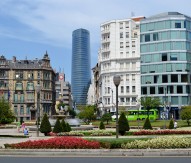

© European Union, 2013
Horizon 2020 and the Knowledge Economy
The Knowledge Economy (KE) supports an estimated 75 million jobs in Europe, roughly one third of the continent’s employment. According to Máire Geoghegan-Quinn, the European Commissioner for Research, Innovation and Science, it will also be the sector where the majority of new career opportunities will be created as Europe begins its return to prosperity.
Addressing delegates in a video message at the ‘Open Innovation 2.0’ conference, which was attended by Pan European Networks, Geoghegan-Quinn, described the KE as the “basis of Europe’s competitiveness” and would, along with the goals of the Innovation Union, would help transform the continent’s economy.
“Europe must be a hub for innovation products, services and business models and the Innovation Union is a key ally in reaching these goals. The Innovation Union comprises 34 policies and initiatives to improve the framework conditions for innovation. We’re making excellent progress with decisions on a unitary patent, venture capital passport and faster standardisation for new technologies; we’re helping the European Union be part of the Innovation Union.”
Next year will see the start of Horizon 2020, the EU’s next research and innovation framework programme. The replacement for FP7 will focus on several key ideas, including developing continent’s excellence science base, bringing more new products to market and tacking the Europe’s grand societal challenges. According to Geoghegan-Quinn, these goals, as well as many others, can be achieved through the creation of a KE in Europe.
“Whilst there will be a strong focus on funding excellent research in Horizon 2020, there will also be a new emphasis on innovation and the impact of growth and jobs. Horizon 2020 has been designed to seamlessly cover all the stages of the innovation process from inception to the market. Products will demonstrate that new technologies are industrially viable, they will pilot new services with and they will validate if products can work on a sufficiently large scale to be commercially successful.
“The programme is also here for solving society’s greatest challenges such as an ageing demographic, food security, resource efficiency and climate action. In developing Horizon 2020, we have made sure to take a very broad definition of innovation. Of course, we want to boost technological innovation but we also want to enhance social innovation and open innovation in Europe. Certainly one very important way that Europe can increase innovation and competitiveness is by improving the circulation of knowledge from the public sector to the private and to support a more open innovation ecosystem,” the Commissioner told delegates.
“Europe has excellent research capacities in many fields,” she added, “but we can improve how we bring good ideas to the market. Therefore, we need more public-private knowledge transfer and open innovation to ensure that the money we invest into research and innovation links to the spread of new technologies and brings tangible benefits for society. That is why open innovation is so important, not just for companies but for the community as a whole and by community I don’t just mean professional scientists but innovators.”
Later this year, Dublin City Council will announce the ‘Digital Dublin roadmap’ that will help position the Irish capital as world leader in smart city technologies. This, says Geoghegan-Quinn, is only possible through greater collaboration between the public, private and academic sectors.
“Dublin, the host city of this conference, is no stranger to open innovation or the triple helix between industry, academia and government. New partnerships between various actors, businesses, local authorities and researchers can help transform cities like Dublin into major hubs in the global network of ideas and talent and it is at the intersection between the different actors and their different roles that innovation can spark-off and lead in unpredictable and new directions.”
Commissioner Máire Geoghegan-Quinn





